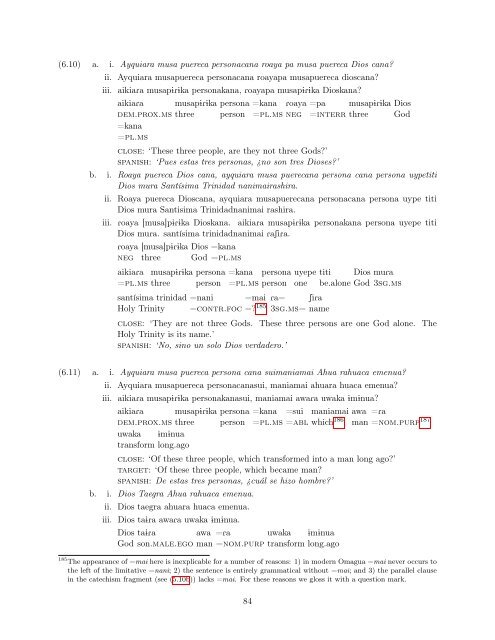draft manuscript - Linguistics - University of California, Berkeley
draft manuscript - Linguistics - University of California, Berkeley
draft manuscript - Linguistics - University of California, Berkeley
You also want an ePaper? Increase the reach of your titles
YUMPU automatically turns print PDFs into web optimized ePapers that Google loves.
(6.10) a. i. Ayquiara musa puereca personacana roaya pa musa puereca Dios cana?<br />
ii. Ayquiara musapuereca personacana roayapa musapuereca dioscana?<br />
iii. aikiaRa musap1R1ka personakana, Roayapa musap1R1ka Dioskana?<br />
aikiaRa<br />
dem.prox.ms<br />
=kana<br />
=pl.ms<br />
musap1R1ka<br />
three<br />
persona<br />
person<br />
=kana Roaya =pa musap1R1ka Dios<br />
=pl.ms neg =interr three God<br />
close: ‘These three people, are they not three Gods?’<br />
spanish: ‘Pues estas tres personas, ¿no son tres Dioses?’<br />
b. i. Roaya puereca Dios cana, ayquiara musa puerecana persona cana persona uypetiti<br />
Dios mura Santísima Trinidad nanimairashira.<br />
ii. Roaya puereca Dioscana, ayquiara musapuerecana personacana persona uype titi<br />
Dios mura Santisima Trinidadnanimai rashira.<br />
iii. Roaya [musa]p1R1ka Dioskana. aikiaRa musap1R1ka personakana persona uyepe titi<br />
Dios muRa. santísima trinidadnanimai RaSiRa.<br />
Roaya<br />
neg<br />
[musa]p1R1ka<br />
three<br />
Dios =kana<br />
God =pl.ms<br />
aikiaRa musap1R1ka persona =kana persona uyepe titi Dios muRa<br />
=pl.ms three person =pl.ms person one be.alone God 3sg.ms<br />
santísima trinidad<br />
Holy Trinity<br />
=nani =mai Ra= SiRa<br />
=contr.foc =? 185 3sg.ms= name<br />
close: ‘They are not three Gods. These three persons are one God alone. The<br />
Holy Trinity is its name.’<br />
spanish: ‘No, sino un solo Dios verdadero.’<br />
(6.11) a. i. Ayquiara musa puereca persona cana suimaniamai Ahua rahuaca emenua?<br />
ii. Ayquiara musapuereca personacanasui, maniamai ahuara huaca emenua?<br />
iii. aikiaRa musap1R1ka personakanasui, maniamai awaRa uwaka 1m1nua?<br />
aikiaRa musap1R1ka<br />
dem.prox.ms three<br />
uwaka 1m1nua<br />
transform long.ago<br />
persona<br />
person<br />
=kana =sui maniamai awa =Ra<br />
=pl.ms =abl which 186 man =nom.purp 187<br />
close: ‘Of these three people, which transformed into a man long ago?’<br />
target: ‘Of these three people, which became man?<br />
spanish: De estas tres personas, ¿cuál se hizo hombre?’<br />
b. i. Dios Taegra Ahua rahuaca emenua.<br />
ii. Dios taegra ahuara huaca emenua.<br />
iii. Dios ta1Ra awaRa uwaka 1m1nua.<br />
Dios ta1Ra awa =Ra uwaka 1m1nua<br />
God son.male.ego man =nom.purp transform long.ago<br />
185 The appearance <strong>of</strong> =mai here is inexplicable for a number <strong>of</strong> reasons: 1) in modern Omagua =mai never occurs to<br />
the left <strong>of</strong> the limitative =nani; 2) the sentence is entirely grammatical without =mai; and 3) the parallel clause<br />
in the catechism fragment (see (5.10b)) lacks =mai. For these reasons we gloss it with a question mark.<br />
84
















